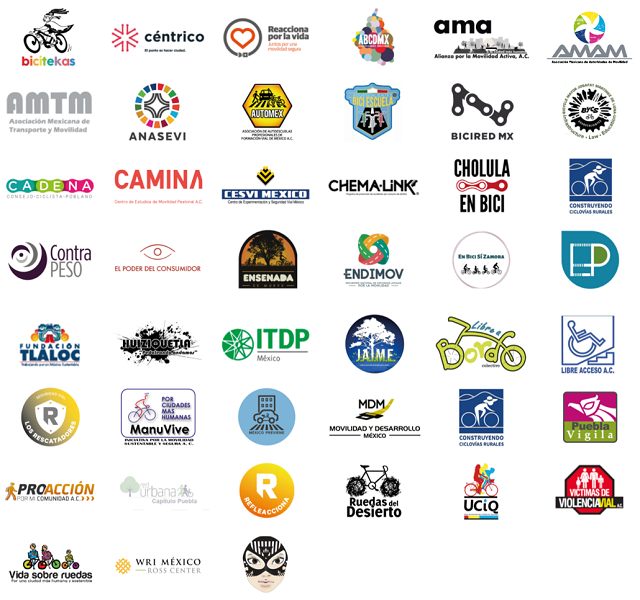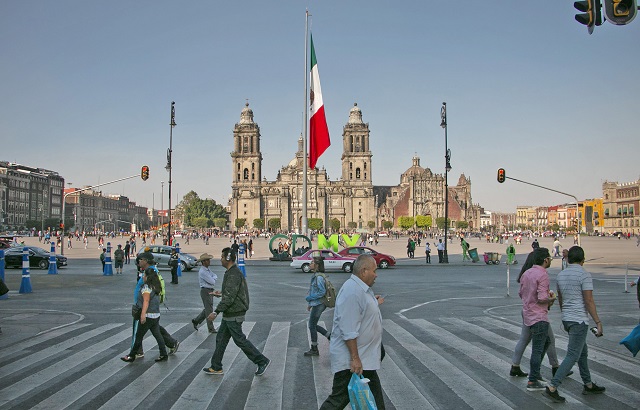Editor's Note: This article originally appeared on The City Fix and is republished here with permission. Do you think Mexico's Right to Mobility amendment could provide better framework for U.S. communities to rethink their transportation networks, too? Let us know on social media.
In a groundbreaking move for national road safety policy, Mexico has elevated to their constitution a universal right to safe mobility. On October 14, the country’s Chamber of Deputies unanimously voted in favor of adding an amendment to Mexico’s constitution: “Every person has the right to mobility under conditions of safety, accessibility, efficiency, sustainability, quality, inclusion and equality.” And on October 30, Querétaro became the 17th out of 32 states to unanimously ratify the change in its local congress, reaching a majority. The change was already approved by the Senate in December 2019.
17 estados ya aprobaron que el #DerechoALaMovilidad sea una realidad para los mexicanos, un derecho que es esencial para la calidad de vida de las personas👏@AdrianaLoboWRI@WRI_Ciudades pic.twitter.com/sHoS93C4vi
— @WRIMexico (@WRIMexico) October 30, 2020
Most national constitutions include the right to free movement and rights to life, health and a clean environment, among others, but Mexico is leading a step further in specifically declaring safe mobility a human right. The distinction reflects growing concern over how dangerous the country’s roads and transport systems can be at times. Despite progress for many years prior, over the past decade, the number of deaths on Mexico’s roads has been increasing. According to the World Health Organization, more than 16,000 people died in traffic crashes in 2016.
The right to safe, quality mobility is grounded in the principle of collective solidarity, as Mexico’s constitutional clause calls for accessibility for all; efficiency in the use of space and resources; environmental, social and economic sustainability; gender, age and income inclusion; and equity as an overarching priority so that the result is a positive change for everyone, not just a fraction of the population.
The impact of this constitutional change has the potential to be profound, both in Mexico and as an example for countries around the world. This is certainly the expectation of the many activists, civil society groups and government officials at Mexico’s national, state and local levels that have advocated for the provision.
Cycling NGOs have made up a fundamental pillar of support, reacting to the country’s multiple cyclist fatalities in recent years, including that of Emmanuel Vara Zenteno, “Manu”, a cyclist and activist who was run over by a bus driver in November 2018. Zenteno was the director of mobility management in the city of Puebla at the time. Areli Carreón, a cycling and road safety activist and one of the most vocal advocates for the amendment, posted a striking photo thread on Twitter of cyclists who had died in recent road crashes during the October congressional session. Carreón’s organization, Bicitekas, added, “They are not statistics; they are people we love. An homage to victims and all the recognition to their families; together for the #RightToMobility.”
No son estadísticas, son personas que amamos. Un homenaje a las víctimas y todo el reconocimiento para los familiares, juntxs por el #DerechoALaMovilidad https://t.co/wAp667nHZa
— Bicitekas (@Bicitekas) October 14, 2020
The Mexican Red Cross also promoted the reform alongside Reacciona por la Vida (“React for Life”), an alliance founded by Víctimas de la Violencia Vial A.C., an NGO supporting victims of road violence, and an insurance company. In total, more than 30 civil society organizations – including WRI México – promoted the constitutional amendment, an effort coordinated by the leaders of Bicitekas, Reacciona por la Vida and Céntrico, a group of sustainable mobility specialists.

During the Chamber of Deputies session, the constitutional change was endorsed across the spectrum of parties and political movements. Speakers recognized the victims of road crashes, and some representatives invited cyclists and victims’ relatives to be onstage during speeches. The level of emotion during the session marked a stark change from typical policy debates. The final vote of 315 in favor, 0 abstentions and 0 votes against (out of 500 deputies) within the voting period of five minutes was an emotional moment as the clock ticked backwards and the collective emotion grew with each positive vote.
As valuable as this step is, it is just one step. The work to translate this right to mobility from principle to action is the crucial next phase. Successful ratification of the constitutional reform by Mexico’s states gives the national Congress a mandate to advance a general safe mobility law, which activists hope will better define responsibilities for all levels of government and establish increased institutional support for addressing road safety issues.
A federal push could help put Mexico back on track to reducing fatalities. The United Nations declared 2021 to 2030 the “second decade of action” for road safety, aiming to encourage countries to reduce road fatalities and serious injuries by 50%. A significant amount of knowledge was accumulated during the first decade of action for road safety (2011-2020), including the efficacy of the Safe System approach – which focuses on infrastructure design, control of behavioral risk factors and safer vehicles – along with better institutions to manage road safety (data, plans, budgets, coordination) and attention to crash victims (rapid emergency response, prepared hospitals, support to families).
“The great challenge is to get the state governments to vote and work on the issues once the general legislation is enacted,” Laura Ballesteros, one of the leaders and activists working on this road safety agenda in Mexico for the last seven years as a member of the Mexico City assembly and an official in the Mexico City government, told Animal Político. “It is a long process, no doubt about it, but it needs to continue.”
Fernando Páez, deputy director of WRI México, emphasized the need to build on the momentum of this step, and the importance of achieving good coordination among levels of government to realize the right to safe mobility. In addition to taking part in Reacciona por la Vida, WRI México contributed to the #YoMeMuevo movement during Mexico’s 2018 elections, which helped spotlight safe mobility as an issue of national importance.
“The reform will allow us to legislate on mobility and road safety,” said Páez, “to have planning processes, infrastructure and services that guarantee all Mexicans quality, accessible and safe mobility.”
Hoy se vota en @Mx_Diputados el #DerechoALaMovilidad. @FerPaezWRIMX, director de movilidad urbana de @WRIMexico, señala la importancia de contar con una coordinación entre niveles de gobierno, a fin de garantizar una movilidad sin exclusión y amigable con el ambiente pic.twitter.com/ZwPvnhmb1H
— @WRI_Ciudades (@WRI_Ciudades) October 14, 2020
No road fatality is acceptable, and the Congress of Mexico has recognized this in establishing safe mobility as a constitutional right for all. The country’s move is a crucial step toward a future in which we no longer have to report tragic losses on our roads and instead treat safe, equitable and sustainable mobility as a basic human right everywhere.
Dario Hidalgo is a Senior Mobility Researcher and supports WRI Ross Center for Sustainable Cities’ international team of transport engineers and planners from Bogotá.






